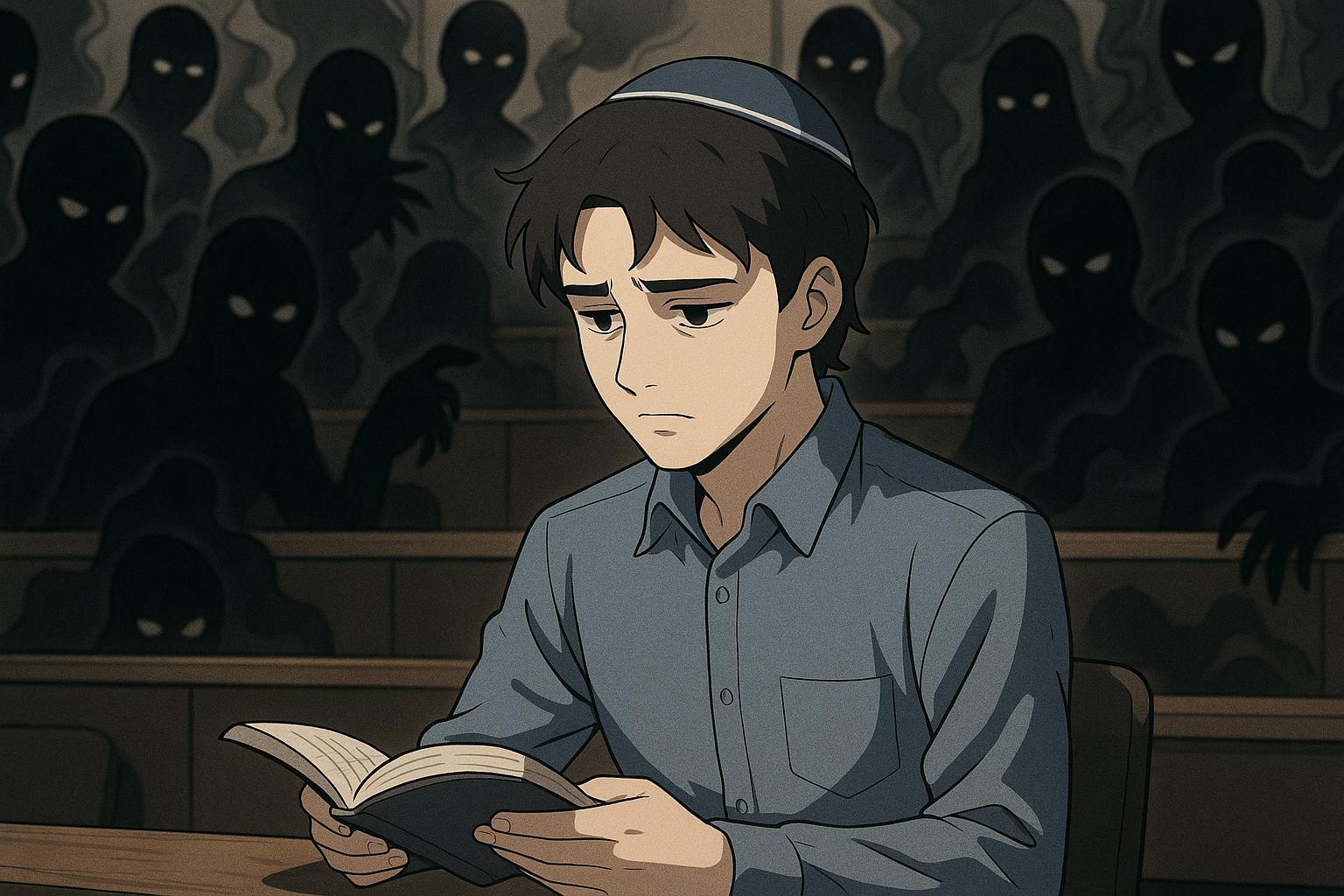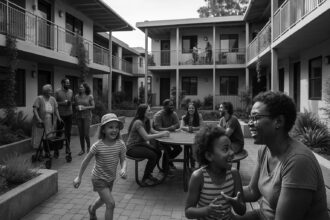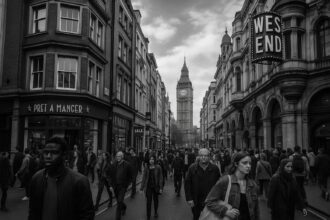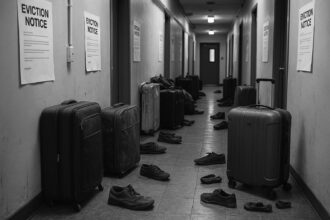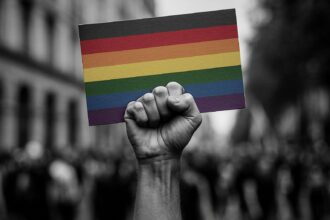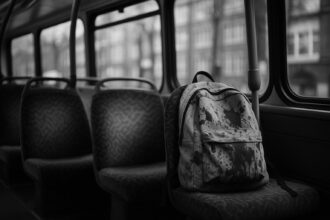A surge in anti-Jewish rhetoric and misinformation within UK universities is intensifying divisions and hostility towards Jewish students, with experts linking the trend to ongoing violence in Gaza and calling for improved education and reporting measures.
A concerning rise in anti-Jewish narratives within university environments has been reported, highlighting a climate that many describe as flourishing unchecked. The ongoing Israeli military action in Gaza, which has escalated since October 7, appears to correlate with this uptick in disinformation permeating academic discussions and lectures. A study by the Henry Jackson Society, a British national security think tank, suggests that over 70 per cent of participants in their survey believe that misinformation has significantly impacted their peers’ understanding of the Israeli-Palestinian conflict.
Among the alarming findings, more than 20 per cent of respondents reported that antisemitic claims have been openly discussed in lectures and seminars. Helen Iyanov, the report’s author, conducted workshops with primarily Jewish students at three unnamed universities. These sessions uncovered a landscape where nuanced dialogue is severely lacking. One student shared, “In most students’ eyes, you are either a ‘Zionist coloniser’, an ‘apartheid apologist’, or a ‘supporter of Palestinian liberation’.” This stark division highlights how antisemitic beliefs have become deeply woven into the fabric of campus life.
The report further noted that hostility towards Jewish students has intensified, prompting fears that they could not freely display their religious symbols, like kippahs and Star of David necklaces. The environment described in the study resonates with findings from other reports, including a notable increase in antisemitic incidents in UK schools, which jumped from 59 in 2019 to 164 by 2021. This trend has raised urgent calls for the adoption of standardised reporting measures, including the International Holocaust Remembrance Alliance’s definition of antisemitism.
Beyond the immediate classroom discussions, recent incidents highlight the inflammatory nature of the current socio-political climate. During a House of Lords debate, Lord Leigh of Hurley recounted actions by the National Education Union members that involved removing Israeli-made products from supermarket shelves, documenting their activities and sharing the footage online. These actions, he argued, serve to perpetuate a climate of antagonism.
Baroness Deech, a former head of the Office of the Independent Adjudicator for Higher Education, went so far as to assert that the root of the behaviour stems from a “religious teaching that Jews are inferior.” She critiqued the educational system, suggesting that Holocaust education, often centred around historical events, fails to address the ongoing showings of antisemitism that students currently face.
This discourse comes amidst a humanitarian crisis in Gaza, where reports indicate a death toll exceeding 50,000, following escalated violence instigated by Hamas attacks on Israel that killed approximately 1,200 individuals, many of whom were civilians. In a further indication of the complexity of engagement surrounding this topic, ten British nationals serving in the Israeli military have been accused of war crimes, which adds layers to the ongoing debates about human rights in the region.
Against this backdrop, the Office for Students, the regulatory body for higher education in England, has acknowledged the rise in anti-Jewish sentiment. They emphasised the necessity for universities to establish effective policies designed to safeguard students from harassment, alongside robust mechanisms to manage incidents when they occur. The push for these measures aligns with recommendations made by the Henry Jackson Society, which advocates for disinformation training sessions and enhanced education about the Holocaust and the Israel-Palestine conflict.
Iyanov noted a “profound deficiency in media literacy” among students, which may exacerbate the spread of misinformation. This situation calls for immediate attention to create a more informed and respectful dialogue within university spaces, ensuring that all narratives are critically examined and that academic environments support freedom from hate and discrimination.
Reference Map
- Paragraph 1
- Paragraph 2
- Paragraph 3
- Paragraph 4
- Paragraph 5
- Paragraph 6
- Paragraph 7
Source: Noah Wire Services
- https://www.dailymail.co.uk/news/article-14726279/antisemitic-claims-university-lectures-flourishing-unchecked.html?ns_mchannel=rss&ns_campaign=1490&ito=1490 – Please view link – unable to able to access data
- https://henryjacksonsociety.org/publications/antisemitism-in-schools/ – The Henry Jackson Society’s report highlights a significant rise in antisemitic incidents in UK schools, with reported cases increasing from 59 to 127 between 2020 and 2021, and further rising to 164 in the subsequent year. The report emphasizes the need for standardized reporting approaches and recommends that schools adopt the International Holocaust Remembrance Alliance (IHRA) definition of antisemitism to improve awareness and incident recording. It also calls for mandatory antisemitism policies, regular inspections by education watchdogs, and annual reporting of incidents to the Department of Education.
- https://henryjacksonsociety.org/publications/antisemitism-in-schools/ – The Henry Jackson Society’s report highlights a significant rise in antisemitic incidents in UK schools, with reported cases increasing from 59 to 127 between 2020 and 2021, and further rising to 164 in the subsequent year. The report emphasizes the need for standardized reporting approaches and recommends that schools adopt the International Holocaust Remembrance Alliance (IHRA) definition of antisemitism to improve awareness and incident recording. It also calls for mandatory antisemitism policies, regular inspections by education watchdogs, and annual reporting of incidents to the Department of Education.
- https://www.express.co.uk/news/politics/1915304/british-universities-antisemitism-Henry-Jackson-report – An article in the Express discusses a report by the Henry Jackson Society revealing a significant rise in antisemitism on British university campuses. The report highlights that antisemitic incidents have reached critical levels and must be addressed without delay. It emphasizes the need for universities to implement measures such as round-the-clock staff presence at protests, improved reporting procedures, and disinformation training sessions. The report also calls for long-term solutions, including enhanced education about the Holocaust and the Israel-Palestine conflict to prevent antisemitic disinformation.
- https://www.express.co.uk/news/politics/1915304/british-universities-antisemitism-Henry-Jackson-report – An article in the Express discusses a report by the Henry Jackson Society revealing a significant rise in antisemitism on British university campuses. The report highlights that antisemitic incidents have reached critical levels and must be addressed without delay. It emphasizes the need for universities to implement measures such as round-the-clock staff presence at protests, improved reporting procedures, and disinformation training sessions. The report also calls for long-term solutions, including enhanced education about the Holocaust and the Israel-Palestine conflict to prevent antisemitic disinformation.
- https://www.express.co.uk/news/politics/1915304/british-universities-antisemitism-Henry-Jackson-report – An article in the Express discusses a report by the Henry Jackson Society revealing a significant rise in antisemitism on British university campuses. The report highlights that antisemitic incidents have reached critical levels and must be addressed without delay. It emphasizes the need for universities to implement measures such as round-the-clock staff presence at protests, improved reporting procedures, and disinformation training sessions. The report also calls for long-term solutions, including enhanced education about the Holocaust and the Israel-Palestine conflict to prevent antisemitic disinformation.
- https://www.express.co.uk/news/politics/1915304/british-universities-antisemitism-Henry-Jackson-report – An article in the Express discusses a report by the Henry Jackson Society revealing a significant rise in antisemitism on British university campuses. The report highlights that antisemitic incidents have reached critical levels and must be addressed without delay. It emphasizes the need for universities to implement measures such as round-the-clock staff presence at protests, improved reporting procedures, and disinformation training sessions. The report also calls for long-term solutions, including enhanced education about the Holocaust and the Israel-Palestine conflict to prevent antisemitic disinformation.
Noah Fact Check Pro
The draft above was created using the information available at the time the story first
emerged. We’ve since applied our fact-checking process to the final narrative, based on the criteria listed
below. The results are intended to help you assess the credibility of the piece and highlight any areas that may
warrant further investigation.
Freshness check
Score:
8
Notes:
The narrative references ongoing events and recent studies, indicating a high level of freshness. However, it also includes historical context and previous studies, which might suggest a blend of new and older information.
Quotes check
Score:
6
Notes:
The quote from a student is not verified in the text, so it cannot be confirmed if it is an original source or previously used. Quotes from notable figures like Baroness Deech are attributed but lack specific original sources.
Source reliability
Score:
7
Notes:
The narrative cites the Daily Mail, which is a well-known publication, but it may not be considered as reliable as other established news sources like the BBC or Financial Times. The Henry Jackson Society is a think tank, which can be seen as a credible source in this context.
Plausability check
Score:
9
Notes:
The claims align with recent geopolitical events and reported trends in antisemitism, which makes them plausible. However, the narrative’s strong stance on the issue may introduce bias.
Overall assessment
Verdict (FAIL, OPEN, PASS): OPEN
Confidence (LOW, MEDIUM, HIGH): MEDIUM
Summary:
The narrative is largely plausible due to its alignment with recent geopolitical events and reported trends in antisemitism. However, the reliability of the source is moderate, and the quotes lack verification. The freshness of the content is high due to references to ongoing events, but it also includes historical context. Overall, while the narrative raises important points, further verification is needed to confirm all details.


